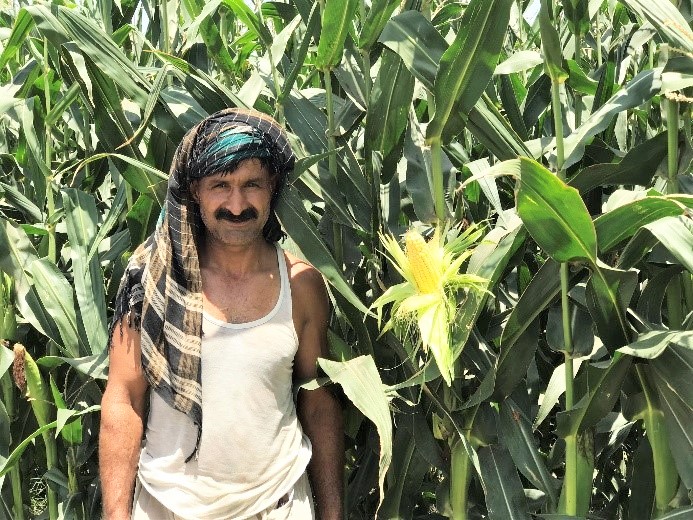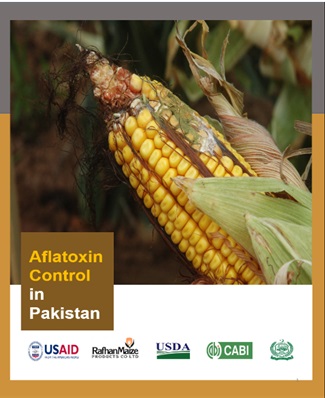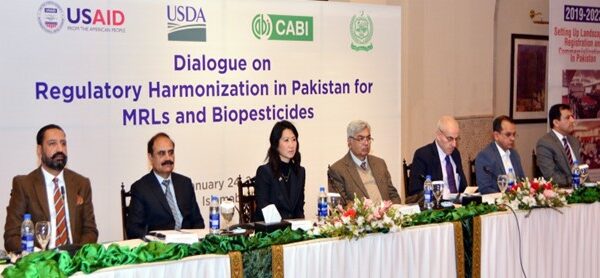
Aflatoxin, produced by a poisonous fungus, is a serious threat to food security by contaminating many of Pakistan’s agricultural products, including cereal grains, chilies, dry fruits, nuts and milk.
Accordingly, Pakistan has taken the regional lead to mitigate the aflatoxin issue in South Asia and CABI has joined hands with the United States Agency for International Development (USAID) and the United States Department of Agriculture (USDA) to lead this new initiative in collaboration with the National Agricultural Research Centre (NARC) and Rafhan Maize Products Co. Ltd.
AflaPakTM is a biological control product for displacing the strains of aflatoxin producing Aspergillus flavus. The active ingredient in AflaPakTM is a naturally occurring, nontoxigenic strain of A. flavus. The primary mode of action is by competition of the nontoxigenic strain of A. flavus with the toxigenic strains of A. flavus, which displaces aflatoxin producing fungi in treated crops.
AflaPak™ efficacy is being tested in field conditions on maize crop in five major maize growing districts of Punjab province, including; Sialkot, Kasur, Okara, Khanewal and Lodhran.
In this regard, CABI, the Crop Diseases Research Institute (CDRI) and Rafhan Maize have completed the field trials of two season (2018-19 & 2019-20) at project sites in selected districts. CDRI’s primary role is to multiply and validate atoxigenic strain on maize crop – which is being further developed into a biocontrol product by Rafhan Maize for the use of farmers to control aflatoxin in maize crop. The biocontrol product – AflaPak™ was broadcasted on selected sites by Rafhan Maize to get the product sporulated and leave its impact on the soil.
To further enhance the technical capacity, and to strengthen the research capability of CDRI on aflatoxins, a state-of-the-art and first ever biocontrol laboratory has been established with the financial support of USAID and USDA under the umbrella of the Aflatoxin Control Programme.
This biocontrol laboratory aims to ensure the food security in the country by validating an eco-friendly biocontrol product to diminish poisonous aflatoxins which have the potential to decimate crops such as maize, wheat and rice.
This biocontrol laboratory will not only facilitate research work on aflatoxins but also provide a platform to the scientists and academia members of Pakistan to replicate the aflatoxin control research work on the pattern of advanced research being implemented in USA and Africa.
To learn about the laboratory protocols for aflatoxin control through biocontrol approaches, a group of scientists from Pakistan received a two-week intensive training course from the Virginia Tech Tidewater Agricultural Research and Extension Centre, USA, under the Cochran Fellowship Program.
The Cochran Fellowship Program training program has benefited the development of Pakistan’s agriculture as the participants acted as ‘Master Trainers’ and extended the trainings to the local stakeholders from the Department of Agriculture Extension, Punjab, and from other allied agencies. In the first phase, capacity building sessions were arranged in Faisalabad, Lodhran, Khanewal, Rawalpindi and Sialkot districts.
Participants (133 men and 16 women) were equipped with aflatoxin prevalence records, its deleterious effects on human and animal health and possible management strategies, with special reference to biological control approach.
To strengthen the concept of biological control of aflatoxin for the provision of improved quality maize crop, the project team further conducted a series of farmer trainings in the selected maize growing areas of Punjab province and implemented 10 trainings during the first phase.
In total, 527 maize growers took part in these training sessions and were educated on the problem of aflatoxin in maize crop, its hazards and implications on human and animal health along with the role of aflatoxin in the rejection of maize consignment. Emphasis was placed on the impacts of financial loss and possible management strategies with special reference to application of AflaPakTM biocontrol.
To sensitize the stakeholders and government agencies – including senior officials within the Ministry of National Food Security & Research (MNFS&R) and policy makers working in the agriculture sector with aflatoxins and its possible biological control through indigenous AflaPakTM, a four-day training workshop was organized in Islamabad.
Here Dr Michael Braverman, Manager Biopesticide, Organic and International Capacity Building Programs, IR-4 Project, Rutgers University, USA, acted as master trainer and shared his global experience to handle the registration process of biocontrol products.
The successful registration of AflaPakTM will lay foundations for adoption and registration of a biocontrol product to manage aflatoxin contamination in crops, initially in maize.
Moreover, this effort will also support regional and global efforts to utilize biocontrol technologies. The endeavours, like Cochran training, are providing a platform where scientists from both the USA and Pakistan will be able to collaborate and work together for a national cause on aflatoxin control for the communities.
Additional information
Aflatoxin Control in Pakistan
Aflatoxin Control Programme

Find out more about CABI’s work on aflatoxin control in Pakistan.
Authors:
Dr Babar E. Bajwa – Project Executive
Dr Sabyan Faris Honey – Project Manager
Contributors:
Dr Hamzah Shahbaz Bhatti
Dr Muzammil Farooq
Mr Saqib Ali
For more information, please contact:
Deborah Hamilton
USDA
202-720-0335
Deborah.Hamilton2@usda.gov
Related News & Blogs
Sindh farmer gains global recognition for sustainable cotton farming innovations
Photo credit: Evronas/Better Cotton. Location: Better Cotton Conference, Istanbul, Türkiye, 2024. Sindh farmer Fateh Muhammad Laghari has gained recognition for his commitment to sustainable cotton farming practices as part of the Better Cotton Member…
5 December 2024




